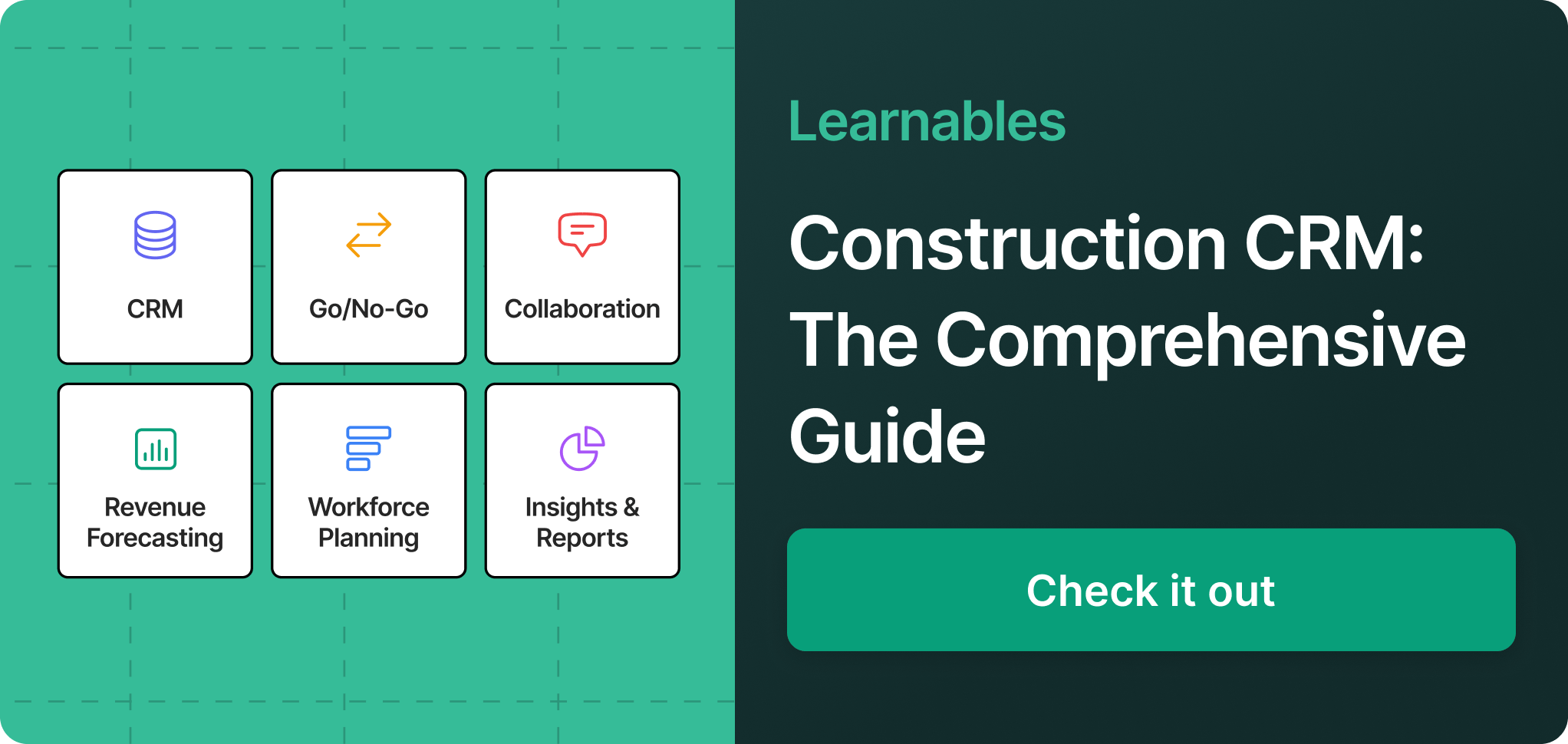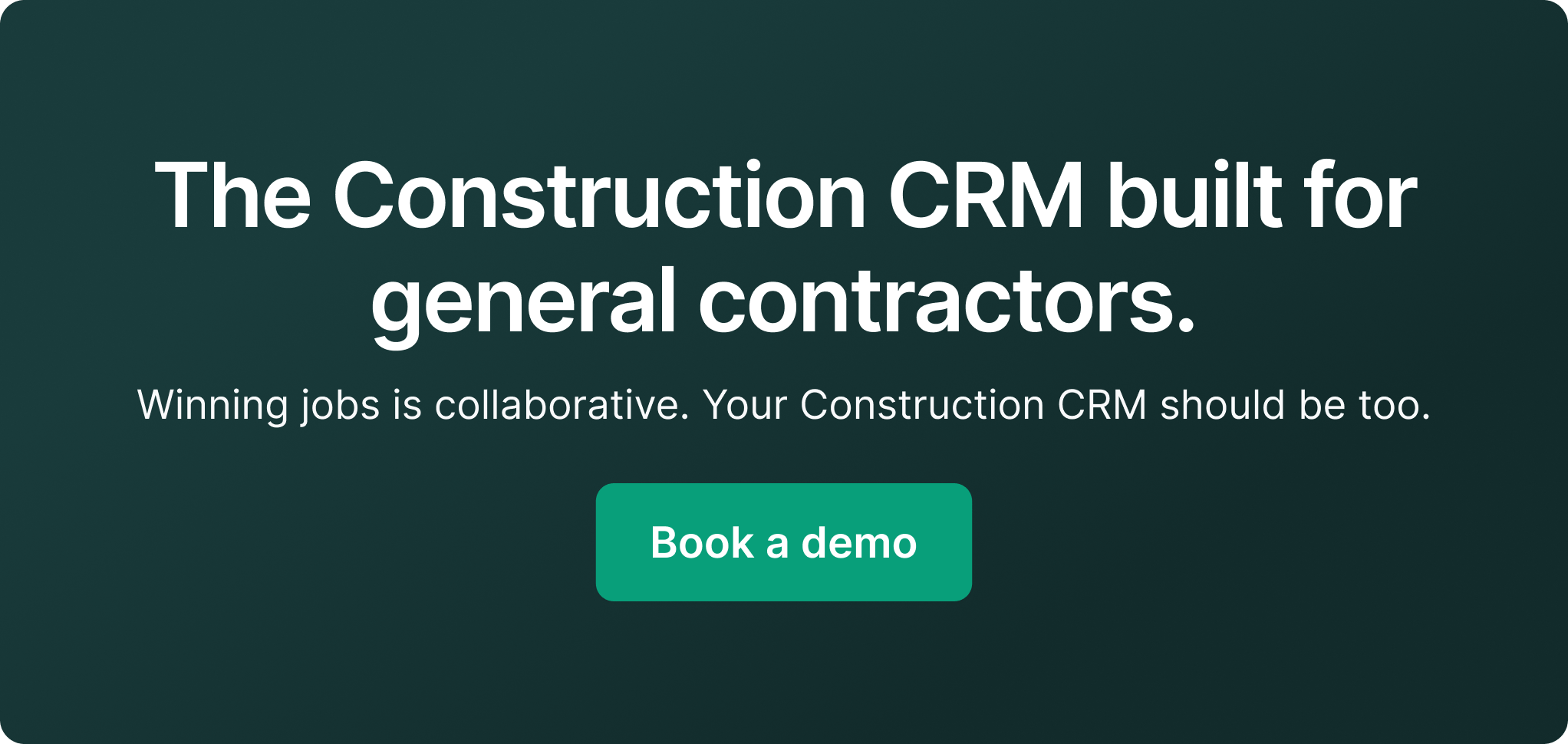The 7 Essential Features of Construction CRM
Unified data, forecasting, workflow automation, and more—the most important features of a construction CRM

Edward Gonzalez
Founder

Construction is complex—we’re not breaking news here.
Keeping track of customers, managing multiple ongoing projects at different stages, and coordinating interdepartmental teams can be overwhelming when it’s tacked onto the attention needed for course-of-construction.
Precise coordination between contractors, suppliers, subcontractors, and customers is vital to ensure successful project completion. Without a proper system for managing these relationships, inefficiency is inevitable, which leads to lower profit margins.
This is where construction CRM comes into play. When used properly, a client relationship management software is the fuel to your entire preconstruction engine.
The 7 Essential Features of Construction CRM
A good CRM should keep all customer details at your fingertips while allowing you to automate key preconstruction processes. More importantly, it should consolidate data sources, providing you current and historical data you need to make informed business decisions.
Of course, not all construction CRMs are created equal.
To get the most out of your construction CRM software, you should strive to pick a solution that offers what we’ve deemed the the most essential features:
- Unified data source
- Client management-at-scale
- Data-driven analytics
- Task automation and reminders
- Interdepartmental collaboration
- Business forecasting
- Mobile Access
Let’s run through the values of each of these features so that you can decide for yourself which ones to prioritize when it comes to vetting a construction CRM for your company.
Note: for the purposes of this blog, we’ll only be taking into account features of an actual construction CRM, ie., any CRM built vertically for the construction industry. Horizontal one-size-fits-all CRM simply will not have all of these construction-specific features without third-party support and extensive customization.
1. Unified Data Source
This one should almost go without saying, though this list would be incomplete without mentioning it—even the least robust construction CRM system should be able to capture all sales and marketing data while retaining all historical data that’s been captured or uploaded previously.
The purpose of capturing data is for it to be accessible, available to be analyzed, and prescriptive for future business decisions. Data can help your sales team identify, capture, and manage leads as they grow into clients—and as those clients grow into repeat clients.
The ability to capture historical project and client data is particularly important for general contractors, considering repeat customers are the lifeblood of their business. Analyzing historical data can help you uncover patterns and identify opportunities for growth.
Having all your contacts in a central location is critical due to the required collaboration needs between all stakeholders in preconstruction. For any one project, contractors typically deal with many contacts including owners, owners’ representatives, architects, designers, suppliers, inspectors, and subcontractors.
A CRM system that houses everyone’s contacts and the notes they have attached to them in a “single source of truth” makes it easier to identify contacts needed to complete specified tasks. No more asking around the office, no more possibility of losing track of anyone.
Without a CRM, client data is scattered and siloed; spreadsheets, notebooks, whiteboards, sticky notes, in people’s heads. You get the point.
If not digitally captured, data has a notorious habit of floating away. With much of the construction industry due to retire in the next decade, you owe it to yourself to make sure that data is captured before it’s lost forever.
2. Client Management-at-Scale
A construction CRM makes it easy to deliver a world-class service to each client, no matter how much your company grows. Think of a CRM as a second brain for general contractors, akin to hiring the most diligent and organized executive assistant for all your team members.
You should be able to look up any contact in your CRM and see a comprehensive, yet easy-to-parse history of every single interaction your company has had with them.
When touchpoints with clients are all logged and searchable, it becomes much easier to understand the depth of all your relationships, especially ‘who’s owed,’ ie., “No one on our team has talked to John in almost a year? Might be time to get round of golf on the books.”
Of course, the possibility for touch-points slipping through the cracks, like in this example, can be negated with proper use of a CRM. Proactive client management such as scheduling touch-points is highly recommended.
“One of our rules is that whenever you finish a task within Buildr, you schedule another one,” said Brandon Weaver of Mint Construction. “There always needs to be a planned future engagement with the client. So I can see if someone says ‘hey, I’ll be ready in 2 months,’ then I’ll make a task to email them in seven weeks. Our customer engagement is way better now because it’s all planned. It’s proactive instead of reactive.”
3. Data-driven Analytics
Business insights are another priceless feature of any good CRM for general contractors. As the saying goes, “What isn’t measured can’t be improved.”
Data is captured so that it can be analyzed. Analyzing data improves your ability to answer your business’ most important questions, like—
“What segments do we have the best win percentage on lately?”
“Which was our most common loss reason last year?”
“What’s the net profit difference between our top client and our 5th best client?”
“What are the reasons we barely broke even on x job and made a killing on y job?”
“Which of our competitors are we most frequently losing jobs in x segment?”
When questions like these can be readily answered, you can optimize every aspect of your business strategy. Opportunities come quicker and easier, your client management improves, and your reputation strengthens.
When your data analytics are on point, you can have a better understanding of the metrics and KPI’s that matter most to your business goals. When you can define those metrics and KPI’s, you can ensure your company is spending time on the right jobs. The right jobs are the jobs that are the most profitable with the least amount of time and resources spent. They’re the jobs where client expectations are met or surpassed and repeat work is ensured.
When your company doesn’t prioritize data analytics at the preconstruction stage, you’re restricting yourself from seeing the bird’s-eye-view of your business totality. When you have little or no visibility, optimal business growth lies somewhere between “sheer luck” and “unlikely.”
As other general contractors in your market continue to develop their business strategies and tech stack that supplements those strategies, that “unlikely” end of the spectrum veers toward “impossible.”
Just like client management-at-scale, data-driven analytics are another construction CRM feature that shifts your business from reactive to proactive.
4. Task Automation and Reminders
A good construction CRM should be able to automate tasks and free up your team’s time to do other revenue-generating activity that only a human could do. We always like to tell our customers: let your CRM handle the mundane and administrative tasks so that you can focus on what matters most—building.
Your CRM should automate daily repetitive tasks such as data entry, appointment scheduling, follow-ups, and sending email reminders—both internally and externally.
A workflow is a repeatable process consisting of a series of steps that must be followed to complete a certain task. You probably have a decided-upon workflow for material acquisition, for example. When steps of that or any workflow are automated, it’s less time-consuming. While it’s difficult to automate every single step of a workflow, the more steps that a machine can do, the better.
A construction CRM that offers end-to-end workflow supplementation will allow you to automate critical processes involved in managing construction, saving your team effort and, most valuably, time.
5. Interdepartmental Collaboration
“In construction, business development is all-hands-on-deck.”
“Every person at a general contractor is in sales.”
“Preconstruction is a team sport.”
We’ve heard these sentiments so many times that it’s a wonder that there are so few options for collaborative construction CRMs in the market.
From business development, operations, marketing, leadership, to finance and estimators—project wins rely on so many stakeholders within your organization working together seamlessly.
If you want to improve internal communication, you’ll first need to break down the barriers that naturally exist between the different teams at your firm. Too often, general contractors work on improving the processes within each isolated department without giving enough care to improving the links between departments.
According to Procore’s recent study with FMI, “The State of Global Preconstruction,” a significant upside was revealed through investment in digitized and effective preconstruction. Survey respondents agreed that collaboration during preconstruction was the number one challenge for builders. Better collaboration results in an improved preconstruction process. A construction CRM with collaborative features works to extinguish the gaps in communication between all your stakeholders.
With a CRM, data that’s normally siloed amongst departments (ie., various whiteboards, everyone has different spreadsheets with different data, that pesky “it’s all in my head,” again) suddenly becomes accessible to the various teams, allowing seamless collaboration and much faster decision-making.
Aside from winning new work, a collaborative CRM also better helps you deliver unparalleled service to your clients, helping you stand out from the competition.
Note: Not all construction CRM offer unlimited seats or prioritize collaboration. Be weary of any CRM that charges you per seat, as you will be incentivized to juke the system and silo your departments before you’ve even started implementation.
6. Business Forecasting
A construction CRM with forecasting functionality is a must-have for general contractors looking to achieve a competitive edge in the ever-evolving construction landscape.
Adept business forecasting in construction has never been more vital for several reasons. Non-exhaustively, those reasons include:
- Inflation,
- Fluctuating input prices,
- Volatile economic uncertainty due to global issues,
- COVID-affected segments that are underperforming causing GCs to segment-hop, and
- More start-up general contractors entering the market than ever
A “whatever happens, happens” mentality is exactly what all your competitors hope you have.
Sales forecasting will help you predict your future revenue based on your historical data and data from your current sales pipeline. Armed with this information, you can prepare in advance and ensure you have enough resources to meet the future demand.
Operations and business development inform each other, as manpower availability dictates which projects you have the capacity to staff. This, again, is why seamless interdepartmental collaboration is so important. Modern CRM solutions that feature workforce management capabilities like Buildr empower you to staff potential jobs and existing jobs simultaneously—months to years in advance.
Sales forecasting enables businesses to make data-driven decisions regarding planning, budgeting, and risk management. It can help you determine if you need to allocate more resources to foster growth and improve your team’s productivity.
7. Mobile Access
In an age where mobile browsing has surpassed desktop browsing, having a CRM solution with mobile access can give you a competitive edge. This is especially true in an industry like construction that may require you to be on the job site, scouting in the field for opportunities, or schmoozing a prospect at a dinner or golf event.
Mobile access to your construction CRM allows you to maintain relationships and log valuable data even when on the move, giving you and the rest of your team the flexibility to check on project progress from anywhere. Moreover, you can reach out to your clients and follow up on business deals without having to hunt down and log on to a desktop computer.
Conclusion
To grow your construction company, you must nurture relationships with existing clients and build new relationships with leads and prospects in a functional, scaleable way that still lets you prioritize boots-on-the-ground building.
A construction CRM makes such a world much more feasible, allowing you to identify and capture leads while watering your existing client relationships without anything ever falling through the cracks. Moreover, it also boosts interdepartmental collaboration, which helps you deliver unparalleled service to your clients and stand tall among your competition.
Not sure where to start when shopping for a construction CRM? These seven features should help you choose a platform that will steer growth, optimize preconstruction, and promote overall collaboration.


